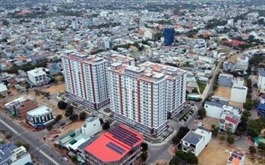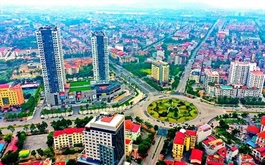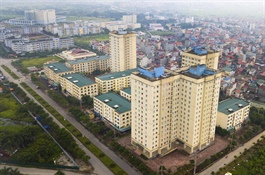Private sector urged to enter eco-IP arena
Private sector urged to enter eco-IP arena
Authorities have been urged to foster participation of the private sector to speed up the creation of eco-industrial parks, contributing to the government's green growth strategy.

The Ministry of Planning and Investment (MPI) is urging a project steering committee to accelerate the transition of traditional industrial parks (IPs) to an ecological model as part of a nationwide eco-IP intervention initiative.
Deputy Minister of Planning and Investment Nguyen Thi Bich Ngoc said, “The project has contributed to the replication of the eco-IP model in Vietnam, in line with the National Green Growth Strategy for 2021-2030, Vietnam’s commitment to the United Nations’ Sustainable Development Goals, and the net-zero emissions commitment to 2050.”
Private sector urged to enter eco-IP arena, illustration photo.
Developing eco-IPs is inevitable as many countries are applying the carbon tax mechanism on imported goods, the deputy minister added. “Meanwhile, many tenants in IPs are manufacturers for export, and they need a green certificate to export products. Thus, relevant parties continue to spread technical and financial support to many IPs at different levels, simultaneously building a mechanism for public-private dialogue to remove obstacles and speed up implementation of eco-IPs.”
Ngoc said that the MPI, other ministries, and localities were willing to cooperate with international organisations to build model eco-parks, which was the basis to extend the model across the country.
“Once the private sector establishes a basic network of eco-IPs, the Swiss State Secretariat for Economic Affairs (SECO) and the UN Industrial Development Organisation will support and consult on them,” she said.
At present, almost all eco-IPs in Vietnam are implemented under a pilot model funded by both organisations, in cooperation with the MPI.
The country is determined to gradually transition traditional IPs to ecological models. The government approved a plan so that by 2030, a total of 40-50 per cent of localities will make the shift. Up to 10 per cent of localities will add eco-IPs to their socioeconomic planning.
However, attracting an inflow of private investors to transform from traditional IPs to ecological models is difficult, let alone developing new eco-IPs, as developing one is more costly. It also takes a longer time to recoup investment capital. Meanwhile, there are still bottlenecks in implementation.
Werner Gruber, head of cooperation at SECO, said, “We believe that the transformation and development of eco-IPs is the first solution for zero carbon in Vietnam. Vietnam already has strategies and policies for this issue. However, the upcoming challenge is to put policies into practice, especially technological solutions.”
Another challenge is to determine the specific demand of the private sector, which is a foundation to establish a public-private cooperation mechanism, Gruber added, while it is necessary to have a criteria framework to recognise eco-IP standards.
Although Decree No.35/2022/ND-CP on the management of industrial and economic zones in Vietnam has been set up to drive the modernisation of the industrial park model, investors still lack specific guidelines. According to experts and representatives of cities and provinces, the decree is simply a premise for formatting eco-IPs as well as transitioning from traditional parks – investors can do nothing except submit an investment plan for approval until there is a specific circular available.
Nguyen Ngoc Hung, a representative of the Department of Debt Management and External Finance under the Ministry of Finance (MoF), said that one of the barriers during the transition from traditional IPs was a capital shortage.
“The MoF is assigned to deploy green financial capital, but at present, it is difficult to approach short-term loans with low-interest rates as Vietnam becomes a middle-income country. Thus, in 2023, one of the key missions is to determine power sources used in the transformation,” Hung said.
Nguyen Thi Dieu Trinh, deputy director of the MPI’s Department for External Economic Affairs, said that to promote the development of eco-IPs, besides mobilising finance from international organisations, it is necessary to expand green finance through commercial channels to more effectively mobilise strong resources from the private sector. “Our department will continue to support the project in connecting to find green finance sources and consider extending the project’s implementation duration,” Trinh said.




























